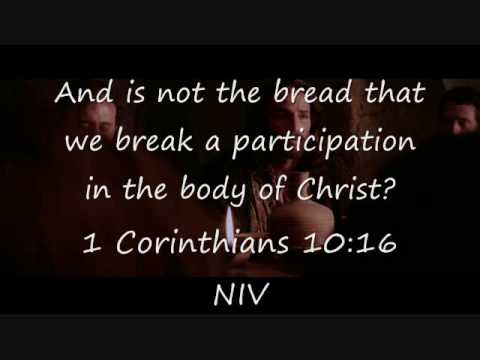 The wounded God. A contradiction in terms. How could God be wounded? And what does it mean about how we participate in the Lord’s Supper?
The wounded God. A contradiction in terms. How could God be wounded? And what does it mean about how we participate in the Lord’s Supper?
In 1 Corinthians 11:23-26 Paul reminds the church what the Lord himself said about the Supper.
For I received from the Lord what I also passed on to you . . . (1 Corinthians 11:23a).
Paul had passed on a sacred tradition. But how had he “received [it] from the Lord? He probably doesn’t mean Jesus personally spoke these words to him, rather that Jesus is the source of the tradition. Either way, the words throb with authority. Thus when we celebrate the Lord’s Supper, we are enacting what he commanded.
The Lord Jesus, on the night he was betrayed, took bread, and when he had given thanks, he broke it and said, “This is my body, which is for you; do this in remembrance of me” (1 Corinthians 11:23b,24).
Paul takes us back to “the night [Jesus] was betrayed, back to that upper room in Jerusalem, before Judas’ final act of handing Jesus over to the Jewish authorities.
This is the Jewish Passover, but Jesus reinterpreted the significance of the bread. “This is my body . . . ” Jesus was speaking what has been called “semitic imagery.” The bread didn’t substantially change into his physical body any more than the cup changed into the new-covenant blood. The bread signifies or represents Jesus body which will be given over to death.
” . . . which is for you . . . ” This bread represents my body which will be given over to death for you.” That is, in behalf of or in place of those eating the bread. The words echo Isaiah 53:12, where the prophet proclaims, “For he bore the sins of many.” So by inviting the disciples to eat the bread which represents his body, Jesus calls them to participate in his death’s benefits.
” . . . do this in remembrance of me” hints that the disciples (and the church) are to repeat this Supper. Passover reminded Israel of rescue from slavery; the Lord’s Supper is to remind Jesus’ followers of the salvation Jesus provided by his death.
Already we see how Paul uses this paragraph to reprove and correct the rich Corinthians who are humiliating the poor at the Lord’s Supper. All the suffering Jesus endured in his Passion was for others. So the wealthy Corinthians, feasting on the meal before the Lord’s Supper, must stop corrupting the meaning of the Supper and consider the plight of their poor brothers.
In the same way, after supper he took the cup, saying, “This cup is the new covenant in my blood; do this, whenever you drink it, in remembrance of me” (1 Corinthians 11:25).
At Passover, bread was eaten early on and this cup of wine “after supper.” Jesus identified that cup as “the new covenant in my blood.” The new covenant. The covenant prophesied by Jeremiah (626-586 B.C.) . . .
Again, the Lord’s Supper is not to be a one-time or even annual event. ” . . . whenever you drink it” implies regularly repeating it, as a means of recalling the new covenant ratified by Jesus blood and the community bound together by it.
For whenever you eat this bread and drink this cup, you proclaim the Lord’s death until he comes (1 Corinthians 11:26).
“For” indicates the reason given for regularly repeating the Supper. It is a proclamation of the Lord’s death for them. When Jesus’ words are read at the Supper, they proclaim his death. And when they eat the bread and drink from the cup, they proclaim the covenant his death ratified.
The Lord’s Supper words proclaim the salvation of a people. This makes the division between wealthy and poor participants particularly egregious. Christ’s body and blood are for them all—rich and poor. What the Supper signifies is what unites them–and what makes division a corruption of the gospel’s heart.
At the same time the Supper looks back to Jesus’ words and death, it looks ahead to Jesus’ return. Paul is thinking eschatologically. The church is to do this “until [the Lord] comes.” They await a glorious future as part of the people of God through Christ.
* * * * *
Jesus’ words remind us how offensive it is to be divided from our brother or sister at the Lord’s Supper. It’s the place for reconciliation–between us and God and between us and our fellow believer.
Rather than focusing on keeping unbelievers out, perhaps we should focus more on drawing believers together.
For then we will truly honor our Lord whose body was for our benefit and whose blood ratified the new covenant that makes us the new and one people of God.



![Walking with God through Pain and Suffering by [Keller, Timothy]](https://images-na.ssl-images-amazon.com/images/I/41LLcCqlRsL.jpg)
Recent Comments